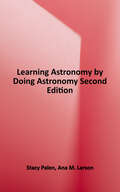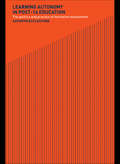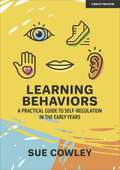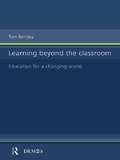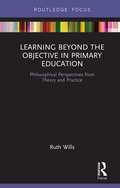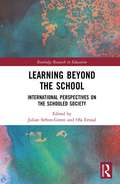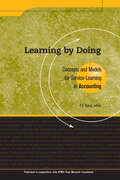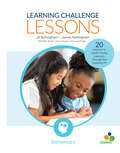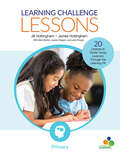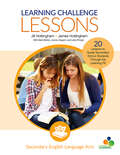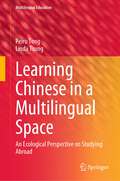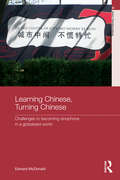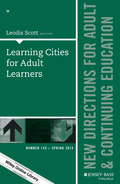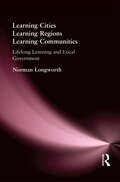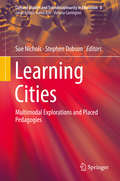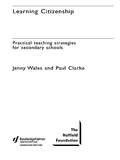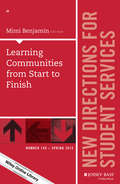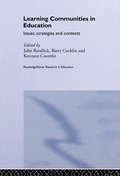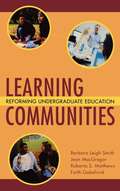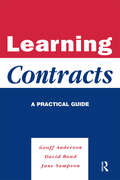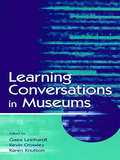- Table View
- List View
Learning Astronomy by Doing Astronomy: Collaborative Lecture Activities, Second Edition
by Stacy Palen Ana M. LarsonResearch shows that students learn best by doing. This workbook, written by two master teachers, contains 36 field-tested activities, including nine new to the Second Edition, that span the introductory astronomy course and can be used in any size classroom. Each activity is now self-contained with an introduction that provides necessary background material for students. Activities are built around a concept that leads students from basic knowledge to a deeper understanding through guided interactions. The Second Edition is supported by Smartwork5, so instructors can easily assess student understanding.
Learning Autonomy in Post-16 Education: The Policy and Practice of Formative Assessment
by Kathryn EcclestoneThis book makes an important contribution to understanding the political, social and educational impact of assessment. Using a multi-layered approach, it offers a fascinating case study of how post-16 assessment systems are designed and debated inside policy making processes. This case study highlights the broader tensions at the heart of assessment policy.The book also explores the complex factors that affect how teachers and students use formative assessment to achieve higher standards of educational attainment and more autonomous learning.Learning Autonomy in Post-16 Education is a comprehensive and authoritative account of policy and practice in post-16 assessment. The book weaves together new theoretical frameworks with evidence from empirical research to offer a detailed picture of the diverse factors affecting the quality of formative assessment in further education.The book will be of particular interest to teachers and practitioners across the post-16 sector on postgraduate and in-service professional development courses. It will also be of interest to researchers, inspectors and qualification designers.
Learning Behaviours: A Practical Guide to Self-Regulation in the Early Years
by Sue CowleyIn this book, Sue Cowley looks at the way that behaviour develops during the earliest years of a child's life, exploring how babies and young children learn behaviours and move from co-regulation to self-regulation. She gives practical advice about how to support children in learning all aspects of positive behaviour while they are in your early years setting. She explores the different behaviours that children need to learn and develop in order to be happy and successful learners in their future school careers and beyond. From learning how to share, to learning how to pay attention; from learning how to be responsible, to learning how to be kind. This book covers all these learning behaviours and much, much more.Learning Behaviours is a book full of practical strategies, realistic suggestions and down to earth advice. Sue offers a step by step guide to getting behaviour right, and a range of case studies to help you understand how the approaches work in practice. Sue Cowley is a qualified early years teacher, the author of over 30 books for teachers and an internationally renowned teacher trainer. She has helped to run her local early years setting for the last ten years.
Learning Behaviours: A Practical Guide to Self-Regulation in the Early Years
by Sue CowleyBest-selling author and qualified early years teacher Sue Cowley looks at the way that behavior develops during the earliest years of a child’s life, exploring how babies and young children learn behaviors and move from co-regulation to self-regulation. Learning Behaviors gives practical advice about how to support children in learning all aspects of positive behavior while they are in your daycare, preschool or kindergarten. Sue explores the different behaviors that children need to learn and develop in order to be happy and successful learners in their future school careers and beyond. From learning how to share to learning how to pay attention; from learning how to be responsible to learning how to be kind – this book covers all these learning behaviors and much more.This is a book full of practical strategies, realistic suggestions and down-to-earth advice. Sue offers a step-by-step guide to getting behavior right, and a range of case studies to help you understand how the approaches work in practice.
Learning Beyond the Classroom: Education for a Changing World
by Tom BentleyEducation has become one of our major concerns, at the heart of any strategy for prosperity and social cohesion. But young people are having more difficulty than ever before in adapting to the world they will enter as adults.Tom Bentley argues that if education is to meet the emerging challenges of the twenty-first century, we must recognise that learning takes place far beyond the formal education sector. We cannot rely solely on dedicated teachers to deliver the understanding and personal qualities young people will need. Instead we must connect what happens in schools to wider opportunities for learning. Drawing on a wide-ranging review of educational innovation and on contemporary analysis of economic, social and technological change, this book shows that creating an education revolution requires us to think far more radically about young people and the options for reform, and outlines a vision of education fit for the twenty-first century.Tom Bentley is a senior researcher at Demos, the independent think-tank. He was born and educated in East London and at Oxford University. His research areas include: young people, education, the future of work and combating of social exclusion.
Learning Beyond the Objective in Primary Education: Philosophical Perspectives from Theory and Practice
by Ruth WillsLearning Beyond the Objective in Primary Education explores an existential perspective for pedagogy proposed in response to the current technocratic paradigm of education prevalent in many countries worldwide. This new perspective is termed ‘Bildung’s Repetition.’ The book seeks to encourage policy makers and educational practitioners to consider the impact of education on children, over and above the meeting of set targets and objectives. Located in a philosophical framework, this book considers how children might learn authentically in the light of their own personal contingency. A series of case studies reflecting the effectiveness of this perspective through the curriculum is provided, each illustrating how ‘Bildung’s Repetition’ allows for personalized meaningful learning within current structures. Recommendations for practice are provided, encouraging all stakeholders in education to consider the value of this perspective, and effect a ‘ten-degree shift’ within educational thought. This unique book fuses theory with practice, and will be of great interest to academics, researchers and students in the fields of primary education and teacher training. It will also be of interest to school leaders and practicing teachers.
Learning Beyond the School: International Perspectives on the Schooled Society (Routledge Research in Education)
by Julian Sefton-Green Ola ErstadWhilst learning is central to most understandings of what it is to be human, we now live in a knowledge society where being educated defines life chances more than ever before. Learning Beyond the School brings together accounts of learning from around the world in organisations, spaces and places that are schooled, but not school. Exploring examples of learning organisation, pedagogisation, informal learning and social education, the book shows not only how understandings of education are framed in terms of local versions of schooling, but what being educated could and should mean in very different social and political contexts. With contributions from scholars based in Australia, Europe, the USA, Latin America and Asia, the book brings together accounts of learning outside of school. Chapters contain rich and detailed case studies of innovative projects, new kinds of learning institutions, youth, peer-driven and community-based activities and public pedagogies, as well as engaging with the dimensions of an argument about the place and nature of learning outside of the school. It challenges dominant versions of school around the world, whilst also critically discussing the value and place of non-institutionalised learning. Learning Beyond the School should be of interest to academics, researchers, postgraduate scholars engaged in the study of comparative education, youth work, education systems, digital culture, sociology of education and youth development. It should also be essential reading for practitioners and policymakers who are interested in youth and education system reform.
Learning By Doing: Concepts and Models for Service-Learning in Accounting
by D. V. Rama Edward ZlotkowskiThe fifth volume in a AAHE and Campus Compact’s series on service-learning in the disciplines, this volume focuses on curriculum reform in accounting programs based on goals identified by accounting educators and describes specific implementations across the accounting curriculum. A practical guide with real solutions for both accounting educators and students.
Learning Challenge Lessons, Elementary: 20 Lessons to Guide Young Learners Through the Learning Pit (Corwin Teaching Essentials)
by James A. Nottingham Jill Nottingham Mark Bollom Joanne Nugent Lorna Pringle"James Nottingham’s work on Challenging Learning is a critical element of creating Visible Learners. This new series will help teachers hone the necessary pedagogical skills of dialogue, feedback, questioning, and mindset. There’s no better resource to encourage all learners to know and maximize their impact!" John Hattie, Professor & Director, Melbourne Education Research Institute University of Melbourne Looking for more examples and more lesson plans to get started with Learning Challenges? Help is here! Created to accompany The Learning Challenge, the twenty lessons collected in this book grapple with timely concepts and provide teachers with everything needed to run thoughtful, dialogue-driven challenges for elementary school students. Each lesson engages students around an exciting topic of current importance—including social media, voting, health, friendship, space exploration, language, fairness, and other issues—and invites students into the "Learning Pit" to explore their thoughts with others through dialogue. The developmentally-appropriate lessons plans are designed to help young learners Learn new vocabulary in the context of dialogue Challenge themselves to think through complex concepts Follow their natural curiosity and seek answers to questions they pose themselves Think critically about issues and discover alternative viewpoints Explore disagreements reasonably and co-create meaning with others Detailed lesson plans make it easy for teachers to facilitate rigorous and thought-provoking dialogue for students. Teacher resources include Activities to help students progress from surface level thinking to deeper understanding Techniques to get students "into the pit," where contradictions and uncertainties force deeper thinking—and then out of the pit again Full-color activity cards to accompany each lesson Diagrams to help illustrate relationships between concepts for students Each compelling topic challenges young students to think, to be reasonable, to make moral decisions, and to understand another person’s point of view—all critical skills in today’s complex world. Jumpstart meaningful learning for students with these rigorous and engaging Learning Challenge lessons.
Learning Challenge Lessons, Elementary: 20 Lessons to Guide Young Learners Through the Learning Pit (Corwin Teaching Essentials)
by James A. Nottingham Jill Nottingham Mark Bollom Joanne Nugent Lorna Pringle"James Nottingham’s work on Challenging Learning is a critical element of creating Visible Learners. This new series will help teachers hone the necessary pedagogical skills of dialogue, feedback, questioning, and mindset. There’s no better resource to encourage all learners to know and maximize their impact!" John Hattie, Professor & Director, Melbourne Education Research Institute University of Melbourne Looking for more examples and more lesson plans to get started with Learning Challenges? Help is here! Created to accompany The Learning Challenge, the twenty lessons collected in this book grapple with timely concepts and provide teachers with everything needed to run thoughtful, dialogue-driven challenges for elementary school students. Each lesson engages students around an exciting topic of current importance—including social media, voting, health, friendship, space exploration, language, fairness, and other issues—and invites students into the "Learning Pit" to explore their thoughts with others through dialogue. The developmentally-appropriate lessons plans are designed to help young learners Learn new vocabulary in the context of dialogue Challenge themselves to think through complex concepts Follow their natural curiosity and seek answers to questions they pose themselves Think critically about issues and discover alternative viewpoints Explore disagreements reasonably and co-create meaning with others Detailed lesson plans make it easy for teachers to facilitate rigorous and thought-provoking dialogue for students. Teacher resources include Activities to help students progress from surface level thinking to deeper understanding Techniques to get students "into the pit," where contradictions and uncertainties force deeper thinking—and then out of the pit again Full-color activity cards to accompany each lesson Diagrams to help illustrate relationships between concepts for students Each compelling topic challenges young students to think, to be reasonable, to make moral decisions, and to understand another person’s point of view—all critical skills in today’s complex world. Jumpstart meaningful learning for students with these rigorous and engaging Learning Challenge lessons.
Learning Challenge Lessons, Primary: 20 Lessons to Guide Young Learners Through the Learning Pit (Corwin Teaching Essentials)
by James A. Nottingham Jill NottinghamThe Learning Challenge Lessons have been created to accompany The Learning Challenge and provide teachers with everything they need to run thoughtful, dialogue-driven Challenges. The Learning Challenge Lessons, Primary, book includes 20 developmentally-appropriate lesson plans that will help young learners: • Learn new vocabulary in the context of dialogue • Challenge themselves to think through complex concepts • Encourage their natural curiosity and seek answers to questions they pose themselves
Learning Challenge Lessons, Primary: 20 Lessons to Guide Young Learners Through the Learning Pit (Corwin Teaching Essentials)
by James A. Nottingham Jill NottinghamThe Learning Challenge Lessons have been created to accompany The Learning Challenge and provide teachers with everything they need to run thoughtful, dialogue-driven Challenges. The Learning Challenge Lessons, Primary, book includes 20 developmentally-appropriate lesson plans that will help young learners: • Learn new vocabulary in the context of dialogue • Challenge themselves to think through complex concepts • Encourage their natural curiosity and seek answers to questions they pose themselves
Learning Challenge Lessons, Secondary English Language Arts: 20 Lessons to Guide Students Through the Learning Pit (Corwin Teaching Essentials)
by James A. Nottingham Jill Nottingham Mark Bollom Joanne Nugent Lorna PringlePractical strategies for bringing The Learning Challenge to life in your secondary ELA classroom The Learning Challenge has captured the imaginations of educators, students, and their parents by introducing the idea of Learning Pit"—a state of cognitive conflict that causes students to think more deeply, critically, and strategically until they discover their "eureka!" moment. Now, fans of the The Learning Challenge who want practical examples and ready-to-use lessons for their secondary ELA classrooms need not look any further. This book provides teachers with everything they need to run thoughtful, dialogue-driven challenges so that students engage more deeply with the classics and develop literary skills critical to ELA standards. Students will analyze texts in lessons grounded in cognitive conflicts such as We are all responsible for our own actions, and yet we sometimes act because we are following orders or instructions from others (Lesson 1: Who was responsible for the death of William in Mary Shelley’s Frankenstein?) To be successful you cannot fail, but most successful people have experienced many failures along the way (Lesson 7: Was Jay Gatsby a success?) Love is impossible to define, and yet everyone knows what love is (Lesson 11: Is Romeo really in love?) From detailed lesson plans and activities for running Learning Challenges in the classroom, to full-color activity cards that enhance each lesson, this must-have resource offers relevant and timely instructional strategies on topics that interest and engage secondary students.
Learning Challenge Lessons, Secondary English Language Arts: 20 Lessons to Guide Students Through the Learning Pit (Corwin Teaching Essentials)
by James A. Nottingham Jill Nottingham Mark Bollom Joanne Nugent Lorna PringlePractical strategies for bringing The Learning Challenge to life in your secondary ELA classroom The Learning Challenge has captured the imaginations of educators, students, and their parents by introducing the idea of Learning Pit"—a state of cognitive conflict that causes students to think more deeply, critically, and strategically until they discover their "eureka!" moment. Now, fans of the The Learning Challenge who want practical examples and ready-to-use lessons for their secondary ELA classrooms need not look any further. This book provides teachers with everything they need to run thoughtful, dialogue-driven challenges so that students engage more deeply with the classics and develop literary skills critical to ELA standards. Students will analyze texts in lessons grounded in cognitive conflicts such as We are all responsible for our own actions, and yet we sometimes act because we are following orders or instructions from others (Lesson 1: Who was responsible for the death of William in Mary Shelley’s Frankenstein?) To be successful you cannot fail, but most successful people have experienced many failures along the way (Lesson 7: Was Jay Gatsby a success?) Love is impossible to define, and yet everyone knows what love is (Lesson 11: Is Romeo really in love?) From detailed lesson plans and activities for running Learning Challenges in the classroom, to full-color activity cards that enhance each lesson, this must-have resource offers relevant and timely instructional strategies on topics that interest and engage secondary students.
Learning Chinese in a Multilingual Space: An Ecological Perspective on Studying Abroad (Multilingual Education #41)
by Linda Tsung Peiru TongThis book examines the benefits of an Australian in-country study (ICS) in China programme and explores ways to maximise the short-term ICS experience in a multilingual space. The book employs an ecological perspective which has seldom been used to examine the study abroad context. It emphasises the importance of the space itself as an arena of interaction, belonging and power, where conduct and modes of communication are often regulated by political authorities and societal expectations. Specifically, the book focuses on the following: • the extent to which the ICS facilitated interaction in different settings • the way in which interaction during ICS contributed to language learning • the degree in which the interaction during ICS contributed to culture learning and • the role of identity in the learning process in the ICS. The main argument of the book is that while the ICS promoted multilingual learning space for in-class and out-of-class interactions, which further facilitated language and culture learning to a great extent, Australian students’ identities and self-concepts also played a core mediating role throughout individual learning trajectories.
Learning Chinese, Turning Chinese: Challenges to Becoming Sinophone in a Globalised World (Asia's Transformations)
by Edward McDonaldIn this book Edward McDonald takes a fresh look at issues of language in Chinese studies. He takes the viewpoint of the university student of Chinese with the ultimate goal of becoming 'sinophone': that is, developing a fluency and facility at operating in Chinese-language contexts comparable to their own mother tongue. While the entry point for most potential sinophones is the Chinese language classroom, the kinds of "language" and "culture" on offer there are rarely questioned, and the links between the forms of the language and the situations in which they may be used are rarely drawn. The author’s explorations of Chinese studies illustrate the crucial link between becoming sinophone and developing a sinophone identity – learning Chinese and turning Chinese. Including chapters on: relating text to context in learning Chinese the social and political contexts of language learning myths about Chinese characters language reform and nationalism in modern China critical discourse analysis of popular culture ethnicity and identity in language learning. This book will be invaluable for all Chinese language students and teachers, and those with an interest in Chinese linguistics, linguistic anthropology, critical discourse analysis, and language education. Edward McDonald is currently Lecturer in Chinese at the University of Auckland, and has taught Chinese language, music, linguistics and semiotics at universities in Australia, China, and Singapore.
Learning Cities for Adult Learners: New Directions for Adult and Continuing Education, Number 145 (J-B ACE Single Issue Adult & Continuing Education)
by Leodis ScottLearning cities call for a connection of adult education to elementary, secondary, and postsecondary institutions along with vocational and corporate workspaces. This volume considers how “learning cities for adult learners” could be created in America that promote lifelong learning and education. Encouraging a widespread approach to educate and learn across disciplines, within communities, and inside the minds of all people, topics covered include: • workplace and organizational learning, • community engagement and service learning, • public libraries and cooperative extension, and • leisure, recreation, and public health education.This is the 145th volume of the Jossey Bass series New Directions for Adult and Continuing Education. Noted for its depth of coverage, it explores issues of common interest to instructors, administrators, counselors, and policymakers in a broad range of education settings, such as colleges and universities, extension programs, businesses, libraries, and museums.
Learning Cities, Learning Regions, Learning Communities: Lifelong Learning and Local Government
by Norman LongworthThis book explores the mental and social landscape of the city of today and tomorrow; the way in which people think, interact, work together, learn and live with and among each other. Written to address the urgent need for a guide to the principles and practices of lifelong learning, the topics covered include: an introduction to the idea of learning cities policies and strategies for the learning city, including examples form around the world how to activate learning, involve stakeholders and encourage citizen participation in a learning city or region. Written by one of the world’s foremost thinkers in the field, this book is highly readable and easily accessible to anyone interested in the issues addressed. Workers in local, regional and national government, academics and students of lifelong learning, in addition to anyone with an interest in the future of cities and communities will find this a truly invaluable resource and guide to a way of thinking that many see as the way to a better tomorrow.
Learning Cities: Multimodal Explorations And Placed Pedagogies (Cultural Studies and Transdisciplinarity in Education #8)
by Stephen Dobson Sue NicholsThis book is an interdisciplinary text exploring the learning and educative potentials of cities and their spaces, including urban and suburban contexts, at all stages of life. Drawing on the insights of researchers from diverse fields, such as education, architecture, history, visual sociology, applied linguistics and sensory studies, this collection of papers develops and demonstrates the connection between experience, in all its dimensions, and informal learning in the city. The chapters discuss various sensory domains of experience, considering visual, embodied, and even sexual dimensions in relation to what and how learning operates, and the contributors reflect on their learning and inquiring experiences in the city, with special reference to topics such as narrativity, ‘race’ and ethnicity, equity, urban literacy, re-generation, participation, representation and oral histories.
Learning Citizenship: Practical Teaching Strategies for Secondary Schools
by Paul Clarke Jenny WalesThe Citizenship curriculum aims to help young people to participate more fully in society through the development of a range of relevant skills and knowledge. This book shows how a variety of teaching strategies can be used to teach citizenship skills across a range of curriculum subjects as well as in Citizenship lessons themselves. Topics covered include: developing discussion thinking through debate addressing controversial issues investigating citizenship learning through role play working in groups learning with simulations participation. A lively and practical book which will be invaluable to student teachers and their trainers, Citizenship co-ordinators in schools and advisors across the country. It combines issues of pedagogy with real classroom experiences and demonstrates just how students learn from different teaching strategies.
Learning Communities from Start to Finish: New Directions for Student Services, Number 149 (J-B SS Single Issue Student Services)
by Mimi BenjaminWhile the phrase “learning communities” has various definitions, at the heart of all programs is the goal of enhancing the student learning experience in the community of others. This volume provides valuable information about learning communities--from start to finish--including: • historical and theoretical foundations that guide these programs, • structures of learning communities that provide varied opportunities for student participation, with a focus on specific student populations who may benefit from learning community experiences, and • elements of staffing and assessment, as well as an annotated bibliography of recent learning community literature. The authors consider critical elements of learning community programs and offer recommendations and options for faculty and staff who work with, or hope to work with, this particular curricular and cocurricular learning structure.This the 149th volume of this Jossey-Bass higher education quarterly series. An indispensable resource for vice presidents of student affairs, deans of students, student counselors, and other student services professionals, New Directions for Student Services offers guidelines and programs for aiding students in their total development: emotional, social, physical, and intellectual.
Learning Communities in Education (Routledge Research in Education #1)
by John Retallick Barry Cocklin Kennece CoombeLearning Communities in Education explores the theory and practice of learning communities from an international perspective. Covering primary/elementary, secondary and tertiary levels in a variety of educational contexts, leading researchers discuss:* theoretical issues and debate* processes and strategies for creating learning communities* learning communities in actionThe current experience of the learning community is examined with reference to case studies from England, Ireland, Canada, the USA and Australia. With comprehensive coverage of this much-debated topic and a careful balance between theoretical analysis and case-study material, Learning Communities in Education will be a valuable addition to the literature in this field.
Learning Communities: Reforming Undergraduate Education
by Jean MacGregor Barbara Leigh Smith Roberta Matthews Faith GabelnickLearning Communities is a groundbreaking book that shows how learning communities (LCs) can be a flexible and effective approach to enhancing student learning, promoting curricular coherence, and revitalizing faculty. Written by Barbara Leigh Smith, Jean MacGregor, Roberta S. Matthews, and Faith Gabelnick¾acclaimed national leaders in the learning communities movement¾this important book provides the historical, conceptual, and philosophical context for LCs and clearly demonstrates that they can be a key element in institutional transformation.
Learning Contracts: A Practical Guide
by Boud, David Anderson, Geoff Sampson, JaneLearning contracts have been a successful feature of many university/continuing education programmes over the last 20 years but many staff are still unfamiliar with them or have difficulty using them. This guide introduces the learning contract to those considering using them on their courses.
Learning Conversations in Museums
by Gaea Leinhardt Kevin Crowley Karen KnutsonWhat do people learn from visiting museums and how do they learn it? The editors approach this question by focusing on conversations as both the process and the outcome of museum learning. People do not come to museums to talk, but they often do talk. This talk can drift from discussions of managing the visit, to remembrances of family members and friends not present, to close analyses of particular objects or displays. This volume explores how these conversations reflect and change a visitor's identity, discipline-specific knowledge, and engagement with an informal learning environment that has been purposefully constructed by an almost invisible community of designers, planners, and educators. Fitting nicely into a small but rapidly expanding market, this book presents: *one of the first theoretically grounded set of studies on museum learning; *an explicit presentation of innovative and rich methodologies on learning in museums; *information on a variety of museums and subject matter; *a study on exhibitions, ranging from art to science content; *authors from the museum and the academic world; *a range of methods--from the analysis of diaries written to record museum visits, to studies of preservice teachers using pre- and post-museum visit tests; *an examination of visitors ranging from age 4-75 years of age, and from known and unknown sample populations; and *a lens that examines museum visits in a fine grained (1 second) or big picture (week, year long) way.
